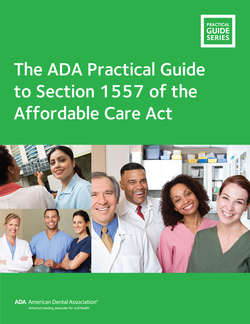Читать книгу Section 1557 of the Affordable Care Act - American Dental Association - Страница 6
На сайте Литреса книга снята с продажи.
Introduction
ОглавлениеSection 1557 of the Affordable Care Act protects individuals from discrimination on the basis of race, color, national origin, age, disability, and sex in federally funded health-related services and coverage. On May 18, 2016, the U.S. Department of Health and Human Services (HHS) published a final rule under Section 1557. The final rule, which applies to dentists and dental practices that receive certain kinds of funds from HHS, is enforced by the Office for Civil Rights (OCR), the federal agency that enforces HIPAA. More information on the final rule is available on the OCR website at www.hhs.gov/civil-rights/for-individuals/section-1557/index.html. A link to the final rule itself is available at www.federalregister.gov/documents/2016/05/18/2016-11458/nondiscrimination-in-health-programs-and-activities.
Dental practices may already be subject to many of the Section 1557 requirements and prohibitions through other applicable federal, state or local laws, such as the Americans with Disabilities Act and Title VI of the Civil Rights Act of 1964. Certain requirements may be new, however, such as the requirement to post taglines and notices, to use “qualified” interpreters and translations (including “qualified” bilingual staff), and the right of an individual or entity to bring a civil action in federal court alleging discrimination. According to OCR, Section 1557 is also the first federal civil rights law to prohibit discrimination on the basis of sex in health care.
The Section 1557 final rule does not generally apply to employment discrimination. Employment discrimination is covered by other federal, state and local laws. However, if a covered dental practice has an employee health program, then the program may be required to comply with the Section 1557 final rule.
Regarding religious exemptions, OCR has stated that the Section 1557 final rule does not include a religious exemption for religious organizations in circumstances in which nondiscrimination obligations conflict with religious beliefs, but the final rule does not displace existing protections for religious freedom and conscience.
The Section 1557 final rule prohibits using marketing practices that discriminate on the basis of disability and other prohibited bases.
The ADA Practical Guide to Section 1557 of the Affordable Care Act1
